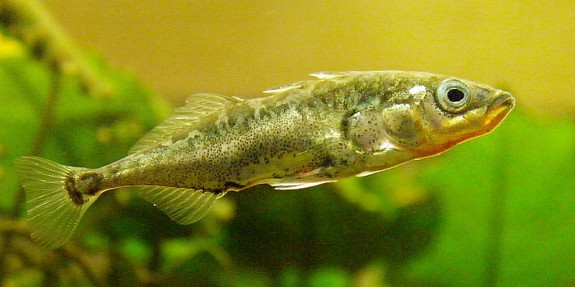Saving Top Predators Could Have a Climate Change Benefit, Too
Through their effect on the food web, shifting predator populations can change greenhouse gas levels

In their trials, the researchers removed three-spined stickleback, among other predators, from experimental waterways, and tracked the effects on the exchange of carbon dioxide. Photo: Jack Wolf
Scientists are well aware of the ways in which predator loss can affect animal communities. Cutting down the size of top predator populations—think lions, bears, sharks—gives a burst of life to the animals they normally eat. The booming prey populations, in turn, eat more of their food, and so on down the chain.
A new study, led by University of British Columbia graduate student Trisha Atwood, found that the loss of predators can affect far more than just the local food web, however. Researchers looked at predator-prey dynamics in experimental freshwater habitats in Canada and Costa Rica and found that, when predators were removed from their experimental waterways, the changes down the web actually culminated in a shift in how much carbon dioxide was being emitted or absorbed by the ecosystem.
Warming temperatures and shifting weather patterns—changes fueled by an amplified greenhouse effect spurred by rising carbon dioxide levels—are expected to threaten the continued existence of “one quarter or more of all species on land by the year 2050.” Marine life, with ocean acidification added to the mix, is also at risk. Through climate change, habitat destruction, hunting and other factors, the web of life in many ecosystems is slowly starting to unravel. Particularly hard-hit in some cases are the top predators.
When the predators were removed, says New Scientist, “carbon dioxide emissions typically increased more than tenfold.”
Atwood’s study of freshwater ecosystems showed how changes to species at the bottom of the food chain, such as photosynthesising algae, following the removal of a top predator dramatically increased the flow of CO2 from the ecosystem to the atmosphere.
The effect will not always be to increase CO2 emissions, however – sometimes the loss of top predators could decrease emissions, she says. “But we show that something so seemingly unrelated, like fishing all the trout from a pond or removing sharks from the ocean, could have big consequences for greenhouse-gas dynamics.”
The research hints at yet more feedback loops that could be lurking behind the mechanisms of climate change. In this case, a warming world could cut down predator populations, altering ecosystems and, in turn, perpetuating the rise of atmospheric carbon dioxide.
More from Smithsonian.com:
Earthworms Could Make Climate Change Worse
Most Arctic Animals Should Deal With Climate Change Just Fine
/https://tf-cmsv2-smithsonianmag-media.s3.amazonaws.com/accounts/headshot/smartnews-colin-schultz-240.jpg)
/https://tf-cmsv2-smithsonianmag-media.s3.amazonaws.com/accounts/headshot/smartnews-colin-schultz-240.jpg)